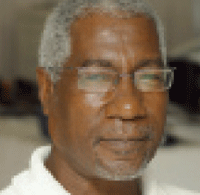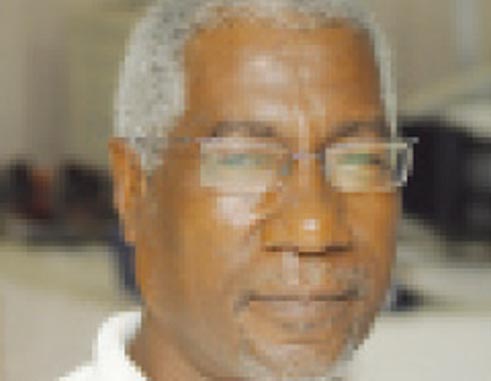
When I started in this journalism business a million moons ago, I had no idea how long I would be in it. I didn’t plan for journalism to be my career. Like my dad, his brothers and most of my brothers, I wanted a life at sea. But after I could no longer sail the seven seas for health reasons four decades ago, I took up my pen and paper here and continued doing what I was already doing at sea: writing about everything I did, heard and saw.
Back when I started writing as a reporter, I wrote with pen and paper. Then I graduated to the typewriter, then to a word processor – and then came the computer. And now there’s the laptop, the i-Pad, the I-phone and the tablet. Indeed today, it’s hard to get hold of a pen or pencil. And some children don’t even know what’s a “fountain pen.”
I have seen many colleagues come and go, but there are now many, many more than when I began. Many know how far back I go, but few would know just how far.
I’ve been lucky enough to have had this job take me around the world two-and-a-half times. Between journalism conferences and assignments representing Saint Lucia and the Caribbean on the world stage, I’ve been on assignments in more than 70 countries in Africa, Asia, Europe and Latin America. I’ve been to work in nearly every CARICOM and OECS member-state. I’ve written for regional and international newspapers and news agencies, reported news for regional and international radio stations, delivered hundreds of TV commentaries and hosted many a radio and TV programme.
I’ve worked at home and abroad, first in Grenada and most in Guyana. My membership of regional and international journalism organizations enabled me to help develop those ties that helped us address fundamental issues facing the Caribbean press over the decades: from self censorship to the advent of marijuana, reggae and the Rastafari movement here and in the region in the 70s, the effects of the influx of US satellite TV across the Caribbean in the 80s, the advent of the Internet in the 90s, the election of a Black President, selection of a Latin American Pope and the turning of the American tide in relations with Cuba in this still brand new 21st century.
I’ve seen it all at home and abroad, yet there’s still so much to see and learn. Every time I write or speak on this job, it’s with the purpose of enlightenment. If only one person learns something new or sees something differently because of what I write or say, my day’s work is rewarded.
I’ve never had a day’s leave, only negotiating time off for occasions like getting married or flying to far corners of the world. Holidays or holy days, I still have to work every day, from morning to evening. I must stay in touch with what’s happening everywhere. I always have more topics than I can handle because in this job your mind has to tick faster than time.
But this job is not for the faint-hearted. Nor is it for those seeking fringe benefits. I know no rich Caribbean or Saint Lucian journalist who works every day. The one thing we all have in common is the will to write and speak to tell the stories people need to know and love to hear. The job isn’t about us, but about the readers, viewers and listeners we serve.
We have to love what we do or we won’t do it well. We must also never forget that we are also citizens — first and foremost — affected by most (if not all of) the things we cover. It is only after we have mastered the art and the craft of making words speak and paint and draw that we will be doing our job well enough.
As I often quote Larry King as saying, “To be on top in the news business, you don’t have to be the first with the story or have the loudest voice. You simply have to ask the right questions – and demand the right answers!” When we ask questions we ought to know the answers, and when we don’t get the right answers we ought to know how to get them. Reporters don’t just report, they also tell the stories the answers to their questions create. Journalists write reports and opinions to encourage discussion and debate. Editors do their best to make words say what their writers mean. That is what we do!
The job requires us to be both stiff and elastic. We will say who did what, where, why and how. But the shorter the story, the quicker it’s seen and heard. Indeed, in this profession, brevity is the best (at times), as there’s no book that can’t be reduced to a chapter, no chapter that can’t be reduced to a paragraph and no paragraph that can’t be reduced to a sentence.
In all my four decades plowing this field, I have enjoyed every minute, including all those jobs I do without pay, simply for the love of writing – and talking. It’s taken some time to get where I am. I consider I have been to the mountaintop of the profession and don’t think there’s much or anything else I will do. But I never expected to be honoured by the nation for my work. My main honour, all my working life, has been awarded each time anyone tells me anything about what I wrote or said. Those are the dividends. Those are the richest rewards: being told you are making that connection through communications. But being honoured in the way I just have is most worthy of my acknowledgement and appreciation.
I do laugh every time someone calls me ‘A good spin doctor’. Sometimes it’s meant to be a compliment, other times a negative comment. But each time I wonder whether they realize that what they’re saying, intended or not, is that in their eyes and ears, I’m good at what I do. I therefore take each such ‘spin’ on exactly who I really am, with that in mind.
There are things about me that have never changed. I will always exercise my right to belong to a political party. I will never make political enemies. I will not allow politics to divide me and anyone I went to school with. I will not allow my disagreement with anyone to make them an enemy. I will agree to disagree. I will respect other writer’s views. I will fiercely defend good writing standards. I will continue to criticize my colleagues who refuse to read. I will always encourage new entrants to read, listen and watch news locally, regionally and internationally. I will continue to be of help and available for assistance to any colleague at any time. And I will continue to always see somebody else in anyone who convinces me he or she is only on the job to be seen and heard without making sense, without making a difference.
In other words, I will always be me. I feel very honoured to be honoured, so I will continue to be the same me that I was honoured for before Independence Day (February 22).
I have lots to thank many for being who I am today. I extracted the most I could in the finesse of language and writing from George Odlum and Rick Wayne. I nurtured my regional commitment under my Guyanese-born mentor Rickey Singh. I fine-tuned my skills under Maurice Bishop in Grenada and the two President Jagans in Guyana. Moses Nagamootoo, the current Prime Minister of Guyana, continues to be my lifelong friend and colleague with whom I’ve spent the best of times elsewhere. Today, I want to thank the person who recommended me for this national award. I also want to thank the Prime Minister, the Governor General and the Chancery of the Awards of Saint Lucia for this lofty honour bestowed on poor me.
I have not mentioned my local colleagues, only because they are too numerous to mention. But every genuine member of our profession knows that I value and appreciate their every effort to help do the job of informing people to help them make better decisions. We all help people make choices, which is why we all have to share the responsibility of ensuring we communicate with people the best we can.
I will continue doing just that and will continue to be here chronicling like the chronic chronicler that I am, as much as I can, for as longer as I can, doing the thing I like best, all just for your reading pleasure!
(Earl Bousquet received Saint Lucia’s Medal of Honour (Gold) “for his outstanding contribution in the field of journalism.” The national award was announced on the island’s 37th Independence Day, February 22nd 2016, by Governor General Dame PearletteLouisy as Chancellor of the Chancery of the Order of Saint Lucia, on the recommendation of the Prime Minister and the Cabinet of Ministers of Saint Lucia.)














1 Comment